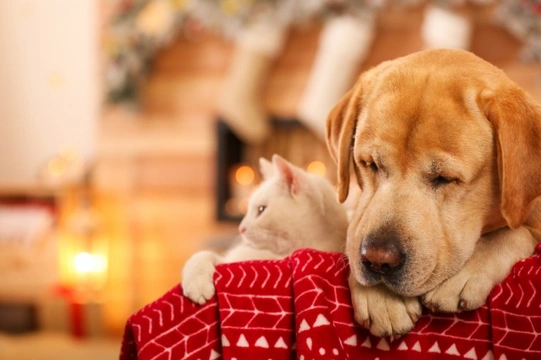
How to tell if your dog is happy and feels relaxed on New Year’s Eve
For a great many dog owners, the word “New Year’s Eve” doesn’t conjure up visions of parties and merriment and having a good time; it conjures up images of the dog cowering under the sofa in fear of fireworks, and potentially, having to clean up a lot of mess around the house as a result of this.
That said, not all dogs in the UK find fireworks to be hugely challenging or frightening, particularly if their owners have taken proactive steps to condition them to accept and remain calm around such stimulus. Even some dogs that do find fireworks alarming will only find that short period of time when fireworks are actively happening to be stressful, and will calm down and recover again quite quickly afterwards.
Some dogs of course aren’t phased by any of it, and take New Year’s Eve in their stride, even if they’re in the thick of a party or generally fully involved in all of your own festivities; which is exactly where many very outgoing dogs like the Labrador retriever love to be!
If you’re unsure how your dog might face New Year’s Eve, or even if you’re confident they want to be fully involved in the festivities and enjoy all of the novelty of things, it is important to monitor how things go and be ready to step in and remove your dog or calm them down if things start getting a bit much.
However, in order to achieve this you first have to know how to identify whether or not your dog is happy, relaxed and in a good frame of mind in the first place, and this is not always easy if you don’t know what signs to look for.
With this in mind, this article will tell you how to tell if your dog is happy and feels relaxed on New Year’s Eve, and some signs that might indicate that they’re not, or that they need a time out. Read on to learn more.
Is your dog happy and relaxed?
A dog can be enjoying themselves and a little excited whilst still being relaxed and happy, and if your dog has reached this balance they’re probably having a great time.
Their body language will be open and friendly, they’ll still be responsive to commands and direction, and they won’t be misbehaving, pushing their luck, or otherwise trying to do things they know are not usually allowed.
Their reactions and responses will be predictable and reliable too; which means that you will be able to read and interpret them accurately. Your dog’s body language should be relaxed and open, and they are in full control of themselves and still able to think clearly and interpret what you say to them.
It will usually be self-evident if your dog is very frightened or suddenly startled by something like fireworks, as they might tremble, hide, display a submissive posture, tuck their tail in and flatten their ears and generally give off a wide range of physical cues.
However, not all dogs will react that quickly or acutely, and any of the following signs might indicate that your dog is no longer really having a good time at your party, or is starting to find it all a bit much:
They’re being a pain or misbehaving
Your dog might be having a really great time in the middle of the party but if they’re being a pain or misbehaving (such as by begging for or stealing food, jumping up at people, barking or otherwise acting out) they have become overstimulated and aren’t having such a great time as it may seem.
We see this in small children as the precursor to a massive tantrum, followed by a deep sleep; but in dogs, this overexcitement and overstimulation can lead to snapping, so it is time your dog had a time out.
They snap or growl
If your dog is growling or being snappy in any context to any person, the same applies. It is important to ensure that other people present know not to tease your dog or disrespect their personal space, but regardless, if your dog has started to get snappy or growl at people in warning, they’re not relaxed and having fun and need to be taken somewhere calm and quiet.
They retreat somewhere quiet
If your dog takes themselves off to their bed or another quiet corner of the house, this means that they have made the decision to have a time out because they’re a little stressed, not having fun anymore, or perhaps just need a rest or a break.
This is absolutely fine and the sign of a well-balanced dog. Check on your dog, but don’t bother them when they do this, and ensure that others know to leave your dog alone. If fireworks or other stimulus starts up later, check on your dog again to see how they’re handling things at that stage too.
They won’t leave you alone
Some dogs stick to their owner’s sides most of the time and will often be somewhat defensive of people trying to come between them, and this is an indicator that your dog suffers from separation anxiety which needs to be worked on over the longer term.
However, if your dog isn’t usually like this but on New Year’s Eve, they’re sticking to your like glue and trying to physically remain in contact with you at all times, this indicates that they’re unsettled or stressed out. Don’t pander to this by keeping them close to you continually; take them to a quiet, relaxed spot such as their crate, give them some favourite toys, and let them relax and get back on an even keel.



